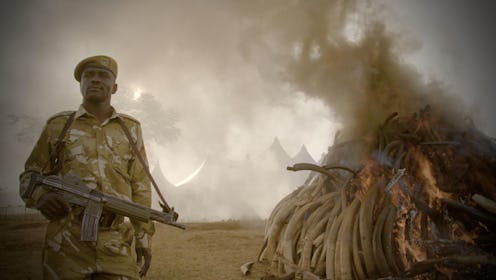Entertainment
Leonardo DiCaprio's New Film Is So Important

Netflix and Leonardo DiCaprio are shedding light on the dangerous elephant poaching crisis in Africa’s Central and Eastern countries in a new, heart-wrenching documentary. The Ivory Game, on Netflix now, enters the trenches of the deeply rooted trade and slaughtering of more than 30,000 African elephants a year due to ivory hunting. This also includes the senseless killings of park rangers who are battling preservation of wildlife with ivory hungry militants. Sadly, the driving influence for people to kill off elephants for financial gain is not discussed in detail in the film, and is left for interpretation — but what the movie does say about poaching is truly enlightening.
Directed by Richard Ladkani and Kief Davidson, the film echoes the harsh reality that one of the biggest mammals on the face of this earth will vanish sooner than we think if poaching continues. Every 15 minutes, an African elephant is killed —that’s the closing statistic from the United Nations Environmental Program, as mentioned in The Ivory Game. The Great Elephant Census (GEC), meanwhile, revealed in a survey that only 352,271 animals were counted for in the countries they surveyed, an eye-opening drop from the 1.3 million elephants accounted for in 1979.
As unfortunate as it is to discover these harsh realities about the endangered wildlife of elephants, the question of why poaching continually happens so often will boggle the minds of viewers. "Traders of ivory actually want the extinction of elephants,” said Craig Millar, head of security and field coordinator of the Big Life Foundation, in an interview with CNN. "The less elephants there are, the more the price rises; the more the price rises, the more people want to kill them. And this is an ever ongoing circle."
An ivory poacher receives about $250 for killing an elephant, according to the film, which amounts to $7 a kilo for ivory that will most likely receive $3,000 per kilo in China. That illegal trade is recognized in the film, connecting the dots of how elephants are butchered and tusks are sent and sold for hundreds of thousands of dollars from countries like Kenya to China. The movie discusses how the Chinese government has even legitimized this trade with a legal “allowance” for domestic consumption of ivory, which encourages the black market participants to use this legality for their own gain of illicit material.
The thriving need and greed for ivory stems from an appetite for luxury goods, but one question that is left dangling in the air in the film is what financial circumstances might get a poacher ignited to be involved in such horrible work. The documentary discusses the relationship between the consumers of the ivory market and the mass killings of the African Elephant, and it's heartbreaking to see the circumstances involved. As a Nigerian-American, I know how much the culture and animals mean to the natives, but I also know the financial circumstances of many rural Africans who are in need of financial stability. Many of Africa's countries are resource-rich places, but have a high volume of poor citizens, and, unfortunately, this can lead to participation in illegal trade. Just as there is sympathy for the extinction of these mammals, there has to be a sympathy for these hunters who may have taken the last resort to get the money they need to survive.
There is hope for change, though. In 2012, the World Bank stated that most African countries will reach middle income status (identified as making at least $1,000 per persona a year) by 2025 if economic growth continues.The financial development of these countries could mean less involvement with poaching, but that's not to say it will definitely happen. Africa is the mother of more than 1,100 different species of mammals, and the decrease of elephants will soon inevitably affect the biodiversity of the world.
The Ivory Game is necessary to see because it just doesn't show the confirmation of an animal issue, but it shows the greed of human consumption and the deadly influence one action can have. Watch this film, and see the reality of the sad connection between people, money, poverty, and greed.
Images: Netflix, Giphy